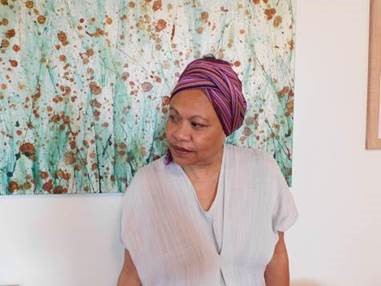Open Lecture | Post-Colonialisms and Global Citizenship Doctoral Programme
Impact and contribution of women to the arts and cultures of contemporary East Timor
May 31, 2024, 10h00-11h30
Room 2.1, Faculty of Economics - UC
Throughout the various historical periods, women have been protagonists of movements in the Global South for social justice and the recognition of their peoples’ cosmologies, finding in cultural and artistic expressions privileged means of communicating and producing knowledges about their histories and cultural identities. In East Timor, Maria Madeira, an art teacher and artist recognised in international contemporary art circuits, has been an interpreter and curator of these stories that carry multiple colonial violences, ancestral knowledges and cultures, particularly those of Timorese foremothers.
Maria Madeira’s visual artworks predominantly use traditional East Timorese materials and symbols, such as the betel nut.
Her paintings and sculptures have mainly centred on East Timorese culture and history, using Western styles, methods, and techniques. In this lecture, the Timorese artist aims to contribute to a broader understanding of the relationship between traditional arts and crafts and contemporary artistic practises, emphasising the impact of Timorese women in textiles, basketry, ceramics, and the performing arts.
This lecture is based on the researcher’s active position in these developments as a visual artist and Timorese woman. It presents a new perspective on the country’s existing discourse, which has subordinated the artistic practises of contemporary visual artists to the predominant artistic and cultural discourse.

Installation/performance “Kiss and Don’t Tell”: Photograph: Juventino Madeira. Courtesy of Galeria Anna Schwartz
Maria Madeira is the first visual artist from East Timor to represent the country at the Venice Biennale, in its 60th edition, under the theme “Foreigners Everywhere”. Timor-Leste’s inaugural pavilion features her exhibition and performance Kiss and don’t tell, which the artist and researcher will reflect on in this lecture from the Doctoral Programme in Post-Colonialisms and Global Citizenship (FEUC/CES).
Bio note
Maria Madeira was taken from Dili with her family by the Portuguese Air Force in 1976, during the Indonesian occupation, and lived for almost eight years in a Red Cross refugee camp in the suburbs of Lisbon. In 1983, the family emigrated to Australia, where Maria Madeira lives and studied art, political science and earned a doctorate in philosophy of art. The artist has exhibited in Australia, Portugal, Brazil, Macau, Indonesia, and East Timor.

Maria Madeira | Photograph © Dennis Phillip Irwin. Courtesy of Anna Schwartz Gallery

